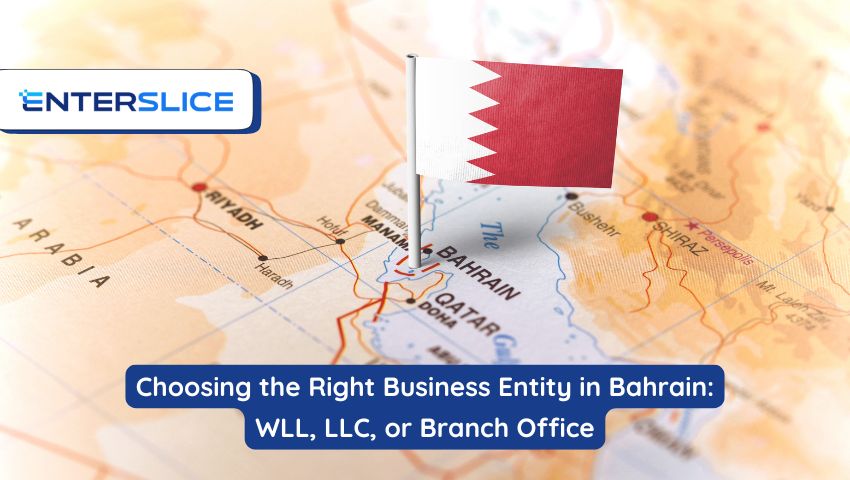
Bahrain has long been recognized as one of the most business-friendly environments in the Gulf Cooperation Council (GCC) region. Its strategic location, liberal economic policies, and commitment to supporting foreign investment make it an attractive destination for entrepreneurs and businesses looking to expand in the Middle East. However, when considering company formation in Bahrain, one of the most critical decisions you will need to make is selecting the appropriate business entity.
There are several types of business structures available in Bahrain, including the WLL (With Limited Liability), LLC (Limited Liability Company), and Branch Office. Each option has its advantages and challenges depending on the nature of your business, investment level, and operational needs. This guide will help you understand the key differences between these business entities and assist you in choosing the best structure for your company incorporation in Bahrain.
1. WLL (With Limited Liability)
A With Limited Liability (WLL) company is one of the most common structures for foreign investors who wish to set up a business in Bahrain. The WLL entity offers liability protection to shareholders, meaning that they are not personally responsible for the company’s debts beyond their capital contribution. This structure is commonly used for small to medium-sized businesses.
Key Features of a WLL:
-
Ownership: A WLL company in Bahrain requires at least two shareholders, who can be foreign or Bahraini. For foreign investors, up to 49% of the company’s shares can be owned by Bahraini nationals. The remaining 51% must be held by a Bahraini national or a Bahraini-owned company.
-
Liability: The liability of shareholders is limited to their share capital in the business. This provides protection for individual shareholders’ personal assets.
-
Capital Requirements: The minimum capital requirement for a WLL is generally lower than that of an LLC. However, the capital needed can vary depending on the nature of the business and specific industry regulations.
-
Management: WLL companies are managed by directors or managers appointed by the shareholders. While the management can include foreigners, certain positions may require local representation.
Benefits of a WLL:
-
Foreign Ownership: With the right local partner, foreign investors can effectively control their business operations.
-
Flexibility: The WLL structure provides flexibility in terms of governance and decision-making processes, making it ideal for businesses looking for operational autonomy.
-
Limited Liability Protection: Shareholders are protected from personal financial liability, which can be important for businesses that wish to limit risk exposure.
Challenges of a WLL:
-
Local Partner Requirement: Although the foreign investor can control the business, the requirement to have a local partner can sometimes be a challenge in terms of building a reliable relationship.
-
Restrictions on Certain Industries: There are some sectors where foreign ownership may be limited, and a local partner may be required to hold a majority stake.
2. LLC (Limited Liability Company)
An LLC (Limited Liability Company) is a common business structure in Bahrain for foreign entrepreneurs looking to establish a presence in the country. It offers a similar level of liability protection to that of a WLL, with shareholders only liable up to the amount of their capital contributions. This structure is widely used by foreign companies in various industries.
Key Features of an LLC:
-
Ownership: An LLC must have at least two shareholders and can have a maximum of 50 shareholders. While foreign investors can own 100% of the shares in some sectors, certain industries may require a local partner or minority shareholder for full ownership.
-
Liability: As the name suggests, shareholders are only liable for the company’s debts up to the amount of their investment, which reduces personal risk.
-
Capital Requirements: The minimum capital requirement for an LLC is typically higher than that for a WLL. However, it can vary based on the type of business and industry.
-
Management: LLCs must have at least one director, and the directors can be either foreign or local. A local resident manager or representative may be necessary for certain business operations or legal compliance.
Benefits of an LLC:
-
Liability Protection: Like a WLL, an LLC protects shareholders from personal liability for the company’s debts, which is particularly valuable for businesses in riskier industries.
-
Industry Flexibility: An LLC provides more flexibility in terms of business activities compared to a WLL. While certain sectors may require a local partner, an LLC can offer more freedom in other fields.
-
Scalability: LLCs are better suited for larger businesses or those that plan to expand and scale in the future, thanks to the ability to have multiple shareholders and increase capital.
Challenges of an LLC:
-
Local Partner Requirement: In some cases, a local partner or shareholder is required to hold a minority stake in the company, which can complicate management decisions.
-
Higher Capital Requirements: The capital requirements for LLCs can be higher compared to WLLs, which may require more upfront investment.
-
Regulatory Compliance: LLCs are subject to more stringent regulatory requirements and must adhere to various local laws, including labor and tax regulations, which may require more administrative effort.
3. Branch Office
A Branch Office is an extension of an existing foreign company. This type of business entity is not a separate legal entity, meaning it operates under the name and financial structure of the parent company. A branch office in Bahrain can engage in full business activities, but it is limited to operating as a representation of the parent company.
Also Read: Requirements for Branch Office Registration in Malaysia
Key Features of a Branch Office:
-
Ownership: A branch office is fully owned by the foreign parent company. There is no need for a local partner in this structure.
-
Liability: The parent company is liable for all the activities and debts of the branch office. This means there is no limited liability protection, and the parent company assumes full responsibility for any financial obligations.
-
Capital Requirements: While there are no specific capital requirements for a branch office, the parent company must demonstrate sufficient financial standing to support the branch’s operations.
-
Management: The branch office is typically managed by a representative from the parent company, who acts as the legal representative in Bahrain.
Benefits of a Branch Office:
-
Full Ownership: As a branch office, foreign investors maintain full control over their operations in Bahrain without the need for a local partner.
-
Direct Access to the Market: A branch office allows foreign companies to directly enter the Bahraini market without setting up a separate legal entity, simplifying the process of establishing a business presence.
-
No Minimum Capital Requirement: There are no specific minimum capital requirements for branch offices, making this option more financially accessible for some companies.
Challenges of a Branch Office:
-
Liability: The parent company assumes full responsibility for the branch’s operations and liabilities, which may expose the parent company to significant risks.
-
Limited Scope of Activities: A branch office can only conduct activities that align with the business of the parent company. It cannot engage in entirely different or unrelated business activities in Bahrain.
-
Regulatory Oversight: Branch offices are subject to strict supervision by the Bahraini government, and they must comply with all local laws, including tax regulations and labor laws.
Also Read: Steps to Register Your Company as Sdn Bhd in Malaysia
Choosing the Right Business Entity
When deciding on the right business entity for your company formation in Bahrain, there are several factors to consider:
-
Business Goals: If you plan to operate on a smaller scale with fewer operational risks, a WLL may be the most appropriate structure. For larger businesses or those seeking more capital flexibility, an LLC may be more suitable.
-
Local Partner Requirements: If you prefer complete control over your operations, a branch office or an LLC with the right local partner may be the best option.
-
Industry Regulations: Some industries in Bahrain may require a specific business structure due to regulatory requirements. Make sure to research your sector’s rules to ensure compliance.
Conclusion
Choosing the right business entity in Bahrain—whether it’s a WLL, LLC, or Branch Office—depends on your business’s unique needs and goals. Each structure has its benefits, limitations, and regulatory considerations. By understanding the differences and requirements of each option, you can make an informed decision that will support your business’s growth and success in Bahrain. Consulting with a local expert or legal advisor can help ensure that you comply with all necessary regulations and take the best approach for your company incorporation in Bahrain.
Frequently Asked Questions (FAQ)
1. What is the difference between a WLL and LLC in Bahrain?
The main difference between a WLL and LLC in Bahrain lies in the capital requirements and the type of ownership structure. A WLL requires at least two shareholders, with up to 49% ownership available to foreign investors. An LLC, on the other hand, is typically used for larger businesses and can accommodate more shareholders, with higher capital requirements.
2. Can I fully own a company in Bahrain?
Yes, foreign investors can fully own a company in Bahrain through a Branch Office or an LLC in certain sectors. However, some industries may require a local partner or minority shareholder.
3. What is the minimum capital required for setting up a business in Bahrain?
The minimum capital requirements depend on the type of business entity and the industry in which you are operating. For an LLC, the capital requirements are typically higher than for a WLL, but they can vary based on the nature of your business.






